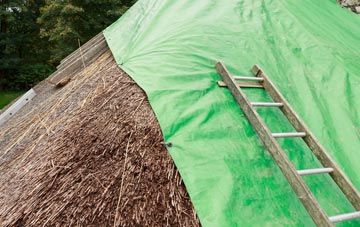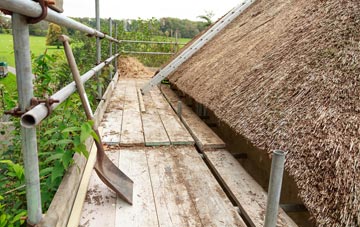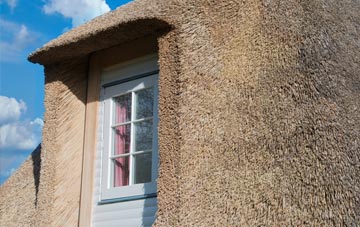Greenwith Common Thatched Roofing Costs
Several factors will directly effect the final cost of a thatched roof, including:
- Size of the roof
- Overall condition of existing thatching (if it’s not a new installation)
- Style and design of the roof
- How thick the thatching needs to be
- Whether netting or wire will be used to keep the thatch together
- Type of flashings that need to be used
- Whether new battens or timbers will be needed or not
- Ease of access to the roof – will scaffolding be needed/ Is the property single or double storey?
- Amount of labour required to complete the job
Pricing for thatching a roof is normally calculated by the square, which is a 10 ft. x 10 ft. or 3 m x 3 m area, and this can range between £650 and £800 per square. Some average pricing examples are shown here:
- A roof that is approximately 100 m² in size and is being built for the first time can cost anywhere between £8,500 and £18,500 to complete – if insulation is required, this cost can rise considerably
- Roofs of about 200 m² can start from around £17,000 to erect from scratch and increase in price to as much as £35,000
- If you require a thatched roof of 300 m² in size, you can expect to pay between £24,000 and as much as £55,000, especially if additional insulation is needed or of the roof is not a simple design
The pricing quoted above will also not normally include the cost of roof windows and dormers – these will come at an additional cost on your quote.
In cases where maintenance and renovations are needed on an existing thatch roof, pricing can vary as follows:
- Finishing off a thatched roof ridge can cost between £70 and £110 per metre
- Renovating an existing thatched roof can come in at around £80 to £140 m²
- Performing general maintenance is usually fairly affordable at between £4 and £10 m²
Although the pricing here may seem excessive, the truth is that a lot of time, effort and expertise are needed when designing and laying thatched roofing. Below are just a few of the aspects that must be considered when obtaining pricing for thatched roof installation, repairs and maintenance:
Assessment and Inspection
Regardless of whether you’re having a completely new thatched roof installed or an existing roof is being maintained, the thatcher will have to see and assess your property in person before an accurate quote can be compiled.
An experienced thatcher will be able to inspect an existing roof to determine whether a new coat will be required or whether a complete replacement roof must be installed.
Labour
Thatching a roof is an extremely labour intensive process, meaning that the job can take quite a while to finish properly. When comparing quotes from different thatching companies, always be wary if there are any that provide labour costs that are substantially lower than those found on other quotations. This could be an indication that a thatcher or any of their general labourers are not highly experienced.
Materials
The second highest expense after labour will be the materials that are needed to complete the thatching work. For example, the most affordable thatching material is usually long straw and this can be created from a combination of rye, wheat, oats and barley.
A slightly costlier alternative to use is combed wheat reed. While this is quite similar to long straw in some ways, it’s processed differently. The most expensive thatching option is water reed, but it does usually have the longest lifespan. As such, it may be worth spending the extra money because it will help save on labour costs at a later stage.
Other materials that are needed to perform thatching include:
- Fixings
- Flashings
- Netting or wiring
- Box gutters
When obtaining quotes, it’s important to enquire with regards to what it includes. Some quotes may display higher prices, but contain absolutely everything needed to thatch your roof, while other lower priced quotes may come with a few surprises at the end in the form of additional costs.
Custom Requirements
If your roof requires any type of work that can only be completed by a master thatcher, this will also push the price of your quotes up. For instance, if your roof requires a specially designed block ridge, only a master thatcher will be able to complete the job properly – which will incur additional costs for their expertise.
Fireproofing
Thatched roofing is highly combustible, meaning that some form of fireproofing must be applied to it. One of three options will be used when fireproofing a thatched roof:
- Thatch batts
- Aluminium barrier foil
- Fire retardant spray
The cost of fireproofing your thatched roofing will depend on the type of fireproofing that is applied.
Other Related Expenses
A thatcher has various other costs to cover when running their business and these are passed on to their clients. One of the main costs is that of the insurance that is required for a thatcher to perform their job.











